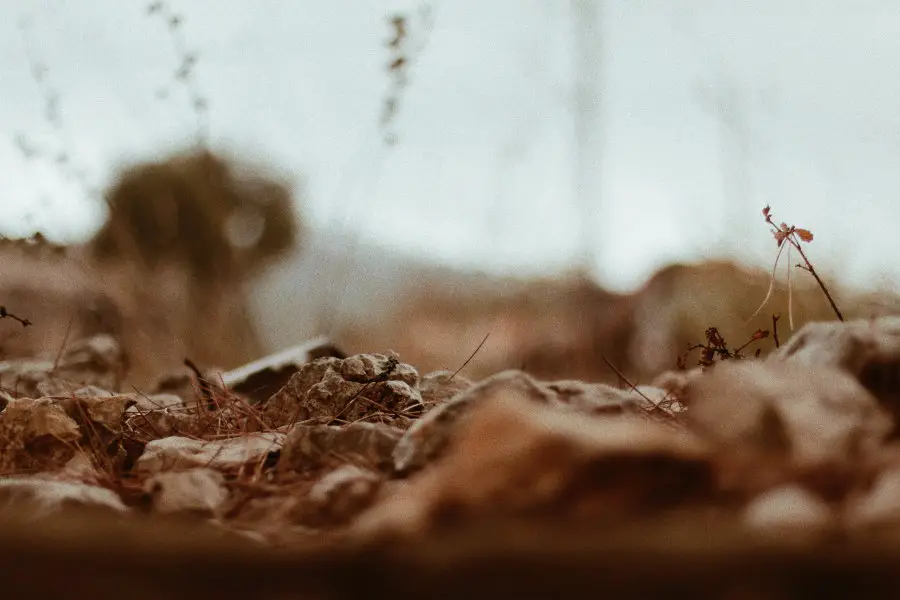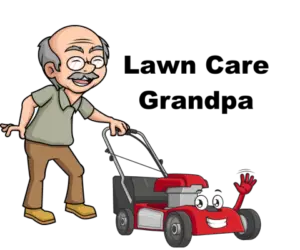Much like driving a car, the use of a lawnmower requires a high level of diligence, care, and alertness if mishaps are to be avoided. Safety must always come first when operating these tools, so you should always keep your eyes peeled for potential pitfalls and hazards.
Rocks definitely can and regularly are thrown from lawn mowers. Flying pebbles or stones from a lawn mower can break windows, injure bystanders, and in some cases damage the mower. Large rocks should be mowed around and smaller or loose ones should be removed from the lawn before mowing.
One of the hazards you and your mower may encounter is rocks, and today, we take a look at what happens when lawnmowers and rocks collide. We will also go over some general safety tips to help you reduce the risk of an all-too-common lawnmower accident. Let’s dive right in.

Contents
Should You Use A Lawn Mower Over Rocks In A Lawn?
The lawn in your yard is a whole ecosystem made up of innumerable living and non-living things. Sometimes, rocks and stones are part of the “non-living things” category and are, understandably, a concern when it’s time to trim the lawn.
Trepidation about mowing over rocks in a lawn is 100% valid as rocks pose a number of threats to your mower, surrounding property, as well as to yourself and any nearby people or animals. As a result, going over rocks in your lawn or driveway with the blades engaged is not a good idea.
Let’s start with how rocks can affect a lawnmower.
Can Rocks Damage A Lawn Mower?
If you have ever hit a rock with the blades engaged on a mower before, you will know what I mean by the loud sound it can make. Many have thought a car has backfired, fireworks have been lunched, or something even more dangerous. Can this sort of impact harm your mower?
Hitting rocks or stones in your lawn with a mower with the blades spinning can do harm to your mower. It can cause denting, cracking, or even shattering of your mower’s blades. Mower decks can also be dented giving occasion for rust to set in along creases and malformations.
Firstly, and perhaps more importantly, collision with rocks is harmful to the blades. Depending on the size and hardness of the rocks, as well as the frequency of collisions, the blades may lose their sharpness or get dented.
In extreme cases, the mower blades may get bent out of shape or even break off entirely. None of these occurrences is ideal for your machine’s efficiency.
Since lawnmower blades are housed within a mower deck, running over rocks could result in rocks bouncing around in this area and causing various amounts of damage and nasty impact sounds. Rocks can easily cause damage to blade adapters, parts of the clutch, and even the crankshaft.
Damage to your mower’s deck and blades will affect the machine’s overall efficiency and effectiveness. Over time, you may notice that you have to make more passes over your lawn than before. Further still, you may notice a decline in cut quality and evenness. Dull and damaged blades tend to tear the grass, which leaves it vulnerable to diseases and pests.
Now, let’s talk about the injury risks.
If you are looking for a high quality mower blade that can take the abuse you have indented, then I recommend this Toro Mulching 22in Mower Blade from Amazon.
Mower Injuries From Thrown Rocks And Other Objects
If the speeds of flying stones thrown by mowers can dent the mowing deck, what could that potentially do to humans or animals it comes in contact with?
Mowers throwing stones can injure eyes, soft tissue, and even cause bone fractures. Though these projectiles after a few feet are not traveling in the same speeds or rotation of a bullet from a gun, they none the less can cause serious injury to both humans and animals in their path.
The number one safety threat when it comes to running over rocks is that the collision with the blades may turn rocks into fast-moving projectiles. A mower can easily fling a rock from the mower deck at any speed or direction.
This can lead to serious injury if it hits the operator or any nearby people and pets. Facial injury and also eye loss is not unheard of.
A less common, but equally frightening possibility is the detachment, or shattering of the blades while they are in motion. The blade could lacerate or even impale the operator or anyone in the vicinity. This is a true horror scenario that could occur if you hit a large rock.
Running over rocks with your mower can also lead to property damage. Rocks thrown from a mower can easily shatter your house and car windows, for instance. Even worse, you could similarly damage your neighbor’s property!
What To Do About Rocks In A Lawn When It’s Time To Mow
To minimize the chances of running over rocks, you should look through your yard before mowing. If you live in an area with snowy winters, there is a good chance that some subterranean rocks and stones may be pushed up to the surface by the time mowing season rolls around.
It is important for either you or someone else to walk over the lawn or field to be mowed looking for small rocks to medium sized stones. These should be moved out of the mowing area to prevent the hazardous condition that hitting them with the mowing blades engaged could cause.
On nearly every crew we ran over the past 40 years has had a “rock and stick guy” that walked over the lawns and removed potential projectiles or mower damaging material.
You can pick up potentially problematic rocks or remove them with a rake, digging bar, or even a powerful leaf blower. If you cannot move certain large rocks, you can mark out their position or trim the grass around them with a string trimmer or garden shears.
Of course, it’s impossible to get rid of every little stone lurking within your lawn. However, you must always stay alert and focused on the path ahead of your lawnmower.
If your mower has a deck with an adjustable height, raise it to about three inches if your lawn has too many stones and pebbles to gather. Not only is this a healthy cutting height for your grass, but it will help keep the mower blades away from rocks that are hidden within the lawn.
If you like this article, you will also like…
- How Fast Does A Lawn Mower Blade Spin?
- What Are Lawn Mower Blades Made Of? – 5 Examples
- How Do I Make My Lawn Mower Blade Spin Faster?
How Far Can A Mower Throw A Rock?
Several factors can determine how far a rock travels after colliding with a mower blade. These factors include:
- Size and weight of the rock
- Speed of the mower blade
- Impact angle
- The density of surrounding grass
Mower blades spinning at an average of 200 miles per hour at the end of the blade can launch small pebbles or rocks nearly 100 feet (30 yards) with speeds reaching 180 miles per hour. At these speeds and distances humans, animals, car windows, and other structures can take significant damage.
A typical walk-behind lawnmower can easily throw a rock to a distance of well over 50 feet at speeds exceeding 160 miles per hour. More powerful garden tractors and zero-turns can throw rocks even further.
Safety measures for lawnmowing
Safety is of the utmost importance with power tools, and lawnmowers are no exception. Statistics from the National Institute of Health show that there are nearly 85,000 lawnmower-related injuries in the U.S. every single year!
To help you, or a loved one, avoid becoming a statistic, we have some lawnmower safety measures for you.
- The first thing you must do before you even start your mower for the first time is read the instruction manual. This is a no-brainer, but most people tend to overlook this. Regardless of your experience level, it is always a good idea to go over the operation and safety guidelines detailed by the manufacturer.
- You should also keep your lawnmower away from children. As a general rule, kids under 12 should never operate a walk-behind mower. Riding mowers should be operated by persons aged 16 and over. If you have young kids, ensure the mower is stored away securely. Also, avoid keeping your riding mower’s keys in the ignition when you’re not using it.
- In addition to rocks, avoid mowing over other bits of debris like wires, litter, and sticks. Sticks with a diameter of one inch or more should be picked up or avoided. Such debris can be turned into projectiles or cause damage to your mower.
- Protective clothing is also highly recommended. Closed safety boots will protect your feet from projectiles and minimize the risk of slipping while the machine is in operation. Safety goggles are not a bad idea either, just in case. Ear protection is also a smart choice to protect your hearing.
- If you use a riding mower, avoid mowing across a hilly surface. Lawn tractors and zero-turns can easily tip over on their sides, especially when the grass is wet. This can lead to a horrific accident and serious injury.
- Also, stay away from the underside of the mower deck. Another no-brainer that is surprisingly ignored at times. The mower blades are no joke, and they can easily slice off a finger or a toe. If you must access the deck, ensure that the mower is off and that the sparkplug is disconnected.
- Electric mowers with power cords can easily electrocute a negligent operator, resulting in serious injury or even death. Avoid using extension cords with exposed wires or sockets, especially in the rain or when the grass is wet.
- Battery-powered mowers can also be dangerous. The batteries on these machines have been known to burst into flames when they age. Always keep an eye on your battery health and replace it before trouble strikes.
Other safety measures to keep in mind include:
- Regular service and maintenance (optimize performance and minimize leaks)
- Not mowing over gravel surfaces or pebbled driveways
- Mowing during the daytime so you can see obstacles clearly
- Not mowing while under the influence
- Not mowing in reverse
To read more about mowers, I recommend my other articles…
- How Fast Does A Lawn Mower Blade Spin?
- What Are Lawn Mower Blades Made Of? – 5 Examples
- How Do I Make My Lawn Mower Blade Spin Faster?
References
https://cutgrasspro.com/how-to-remove-rocks-from-yard/#Why_my_yard_is_full_of_small_rocks
